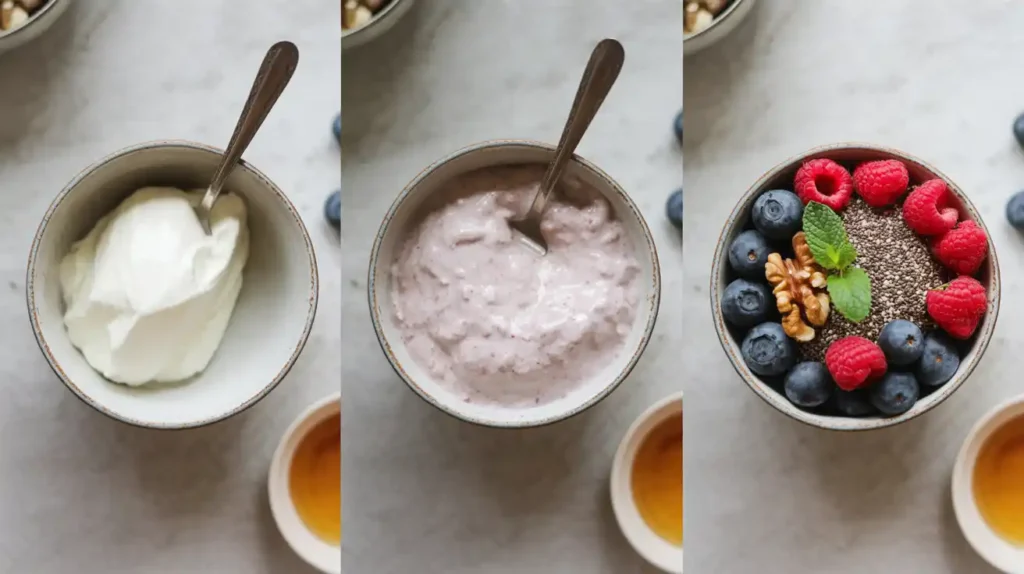Whether you’re powering through a morning meeting, squeezing in a midday workout, or just trying to make it to dinner without snacking on your kid’s crackers… coconut yogurt protein has probably crossed your radar. This high-protein snack promises to do it all keep you full, support muscle recovery, and taste pretty good too.
As a woman juggling family life, deadlines, and let’s be honest, energy dips that hit harder than expected (hello, 2 p.m. crash), I’m always on the lookout for food that fuels without fuss. Coconut yogurt protein sounds like the answer but with so many brands, types, and labels shouting “high protein,” how do you know which one actually delivers?
In this guide, we’ll explore what makes a yogurt high in protein, how to decode the labels, and the best brands to try in 2025 whether you prefer Greek, dairy-free, or something ready to drink on-the-go.
What Is Protein Yogurt and Why Is It So Popular?
At its core, protein yogurt is just yogurt with a nutritional upgrade more specifically, more protein per serving. That extra boost might come from naturally rich sources like strained Greek yogurt or Skyr, or through added ingredients like whey, pea, or soy protein.
And the timing couldn’t be better: between fitness culture, balanced meal planning, and snack-hacking moms like us looking for quick and filling options, high-protein yogurt brands are having a serious moment.
But not all protein yogurts are created equal.
- Greek yogurt often contains 12–18g per cup
- Skyr-style yogurts may push past 20g
- Fortified plant-based options (like Oikos® Pro or Ratio®) often add protein isolates to hit 15–25g per cup
- Meanwhile, standard yogurts might offer just 5g or even less

The variety is massive, and the labels don’t always tell the full story. That’s why learning to spot the real-deal protein yogurts (and skip the fluff) is a game-changer.
Best Protein Yogurt Brands in 2025
With so many yogurts claiming to be “high protein,” it’s easy to get overwhelmed at the store. Here’s a breakdown of the top contenders this year based on nutrition, flavor, and how they actually perform.
| Brand & Type | Protein (per cup) | Sugar (per cup) | Base | Highlights |
|---|---|---|---|---|
| Oikos® Pro 20g | 20g | 0g | Dairy | Ultra-filtered milk, no added sugar |
| Ratio® Protein Yogurt | 25g | 2–3g | Dairy | Highest protein on the market |
| Chobani® Zero Sugar | 12–15g | 0g | Dairy | No added sugar, stevia-sweetened |
| Silk® Greek-Style | 10g | 6–8g | Coconut/Pea | Plant-based, creamy texture |
| Kite Hill® Protein | 10–11g | ~8g | Almond/Pea | Dairy-free, tangy, clean label |
| Siggi’s® Skyr | 15–20g | ~7g | Dairy | Icelandic-style, minimal ingredients |
What to Look For
- Minimum 10g protein = good benchmark
- Low sugar (under 6g preferred)
- Protein source matters – dairy is complete, plant needs variety
- Taste + texture – because no one wants chalky yogurt
Whether you prefer a thick spoonable yogurt or a smooth protein yogurt drink, these brands hit different needs. Oikos® and Ratio® are ideal post-workout; Silk® and Kite Hill® are solid plant-based picks for everyday snacking.
How Much Protein Do You Really Need from Yogurt?
Let’s be real grabbing a yogurt from the fridge is easy. But is it enough to count as a meaningful source of protein?
For most women, a typical day calls for anywhere between 50 to 75 grams of protein, depending on your activity level. If you’re trying to support muscle tone, manage energy dips, or recover from a workout, you’ll want meals and snacks that contribute at least 15–25 grams at a time.
That’s where protein yogurt can shine if you pick the right one.
- A Ratio® 25g yogurt can nearly cover a full snack or small meal’s worth of protein
- Oikos® Pro with 20g can serve as a smart post-gym option
- Greek yogurts generally land between 12–18g, which pairs nicely with seeds or granola to round things out
- Plant-based options like Kite Hill® Protein hover around 10g, so topping them with chia seeds or a spoonful of nut butter helps fill the gap

But if your yogurt only gives you 4g? It’s probably not pulling its weight at least not alone.
Fortified vs Natural Protein Yogurts
Not all protein yogurts build their muscle the same way. Some are naturally protein-rich others get a little extra help. And that difference matters when you’re scanning labels at the store.
Take Greek yogurt or Skyr they earn their high protein the old-school way: by straining out liquid to leave a thicker, more concentrated yogurt. That process amps up the protein naturally, and the result is usually creamy, balanced, and satisfying without much sugar.
Then there are the fortified options like Ratio® or Silk® Greek Style. These get their numbers by adding protein think whey, milk protein isolate, or plant-based blends like pea or soy. They often pack 20 grams or more, but here’s what to watch for:
- What kind of protein is it and is it gentle on digestion?
- Does it come with a sugar bomb on the side?
- Is the texture something you’ll actually enjoy?
Both styles have their place. What matters most is what works for you : your schedule, your goals, and yeah, your taste buds.
Frequently Asked Questions (FAQ)

Which yogurt is high in protein?
Greek yogurts like Chobani® or Skyr are naturally high in protein, with 15 to 20 grams per serving. Fortified brands like Oikos® Pro and Ratio® go even higher some hit 25g thanks to added dairy or plant-based protein.
Are protein yogurts healthy?
Yes when you pick the right one. Look for protein yogurts with minimal added sugar, live active cultures, and real ingredients. They can support satiety, muscle repair, and balanced blood sugar when used as part of a nutritious routine.
Can I eat protein yogurt every day?
Absolutely. A daily serving of protein yogurt can be a quick and convenient way to support your protein intake especially when paired with fiber-rich toppings like oats, seeds, or fruit. Just rotate flavors and types if you like variety.
What is the healthiest yogurt you can eat?
The healthiest yogurts are high in protein, low in sugar, and rich in probiotics. Greek and Skyr-style options usually lead in nutrition. Among dairy-free choices, fortified coconut or almond yogurts with added pea or soy protein are solid picks.
Final Thoughts: Should You Make Protein Yogurt Part of Your Routine?
Protein yogurt isn’t magic but it can be a really smart move.
Whether you’re looking for a quick snack that won’t leave you hungry, a post-workout bite, or a way to hit your daily protein goals without overthinking it, the right yogurt makes a difference. Just remember: the front label might scream “high protein,” but the back panel tells the truth.
Look for 10g or more, keep sugar in check, and choose a texture and flavor that actually fits into your day.
For me, protein yogurt is one of those fridge staples that earns its keep as long as I pick the good stuff.

